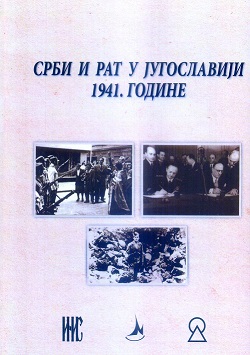Учешће Мађарске у распарчавању Југославије 1941.
Hungary’s Participation in Dismemberment of Yugoslavia 1941
Author(s): Arpad Hornjak
Subject(s): Political history, International relations/trade, WW II and following years (1940 - 1949), Geopolitics, Peace and Conflict Studies
Published by: Institut za noviju istoriju Srbije
Keywords: dismemberment of Yugoslavia; Kingdom of Hungary 1941;
Summary/Abstract: Throughout the inter-war period Hungary was dissatisfied with her borders, including the one with Yugoslavia. Therefore her policy was aimed at loosening the Little Entente whose member Yugoslavia was. Among other things, Hungary used the large Hungarian national minority in Yugoslavia for her revisionist goals. During the late 1930s Hungary’s revisionist ambitions were aimed chiefly against Romania and she was relying on Italy. When WWII broke out, Hungary strove to remain neutral, saving forces for the propitious moment. She used Soviet pressure on Romania in summer 1940 to extort part of Transylvania with German backing. However, the price were concessions to the Third Reich – joining the Tripartite Pact on November 20, 1940 being the biggest. However, in order not to be completely cut off from Great Britain, Hungary sought rapprochement with Yugoslavia. This was encouraged also by the Axis powers. This coincided with their increased pressure on Yugoslavia to joint the Tripartite Pact, which she eventually did on march 25, 1941. However, two days later the government that had signed the Pact was overthrown and Hitler decided to destroy the unreliable ally. Hungary was invited to take part in the attack and have a share of the spoils. Hungarian prime-minister Pal Teleki who opposed that because he didn’t want to sever all ties with Great Britain, committed suicide and Hungary joined in the German-Italian-Bulgarian aggression. The author deems this the logical consequence of two decades long Hungarian revisionist aspirations. As opposed to most Hungarian historians, he is of the opinion that Hungary entered WWII on the day she attacked Yugoslavia, and not on June 22, 1941 when she joined in the attack on the USSR.
Book: Срби и рат у Југославији 1941. године
- Page Range: 251-268
- Page Count: 18
- Publication Year: 2014
- Language: Serbian
- Content File-PDF

